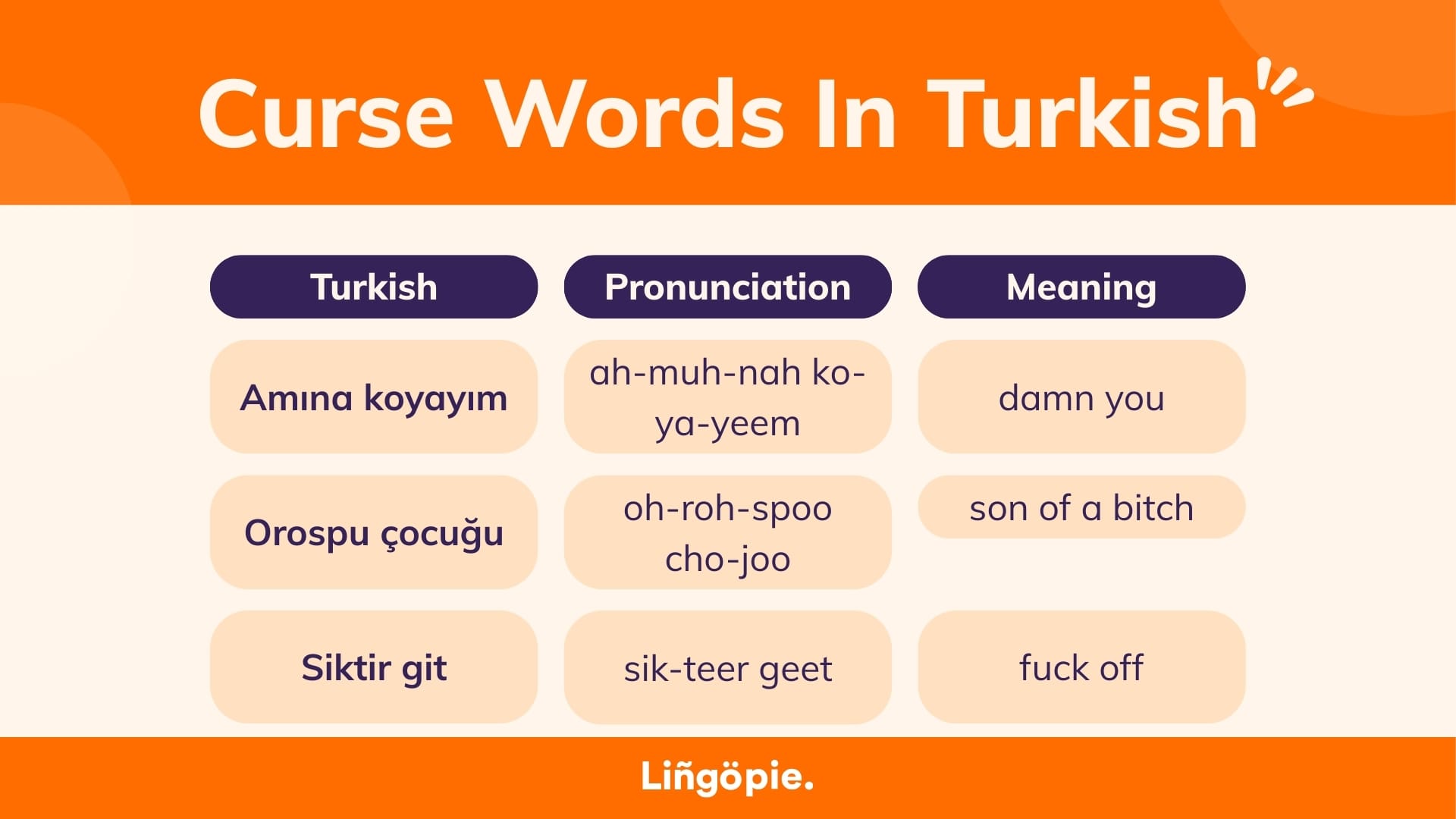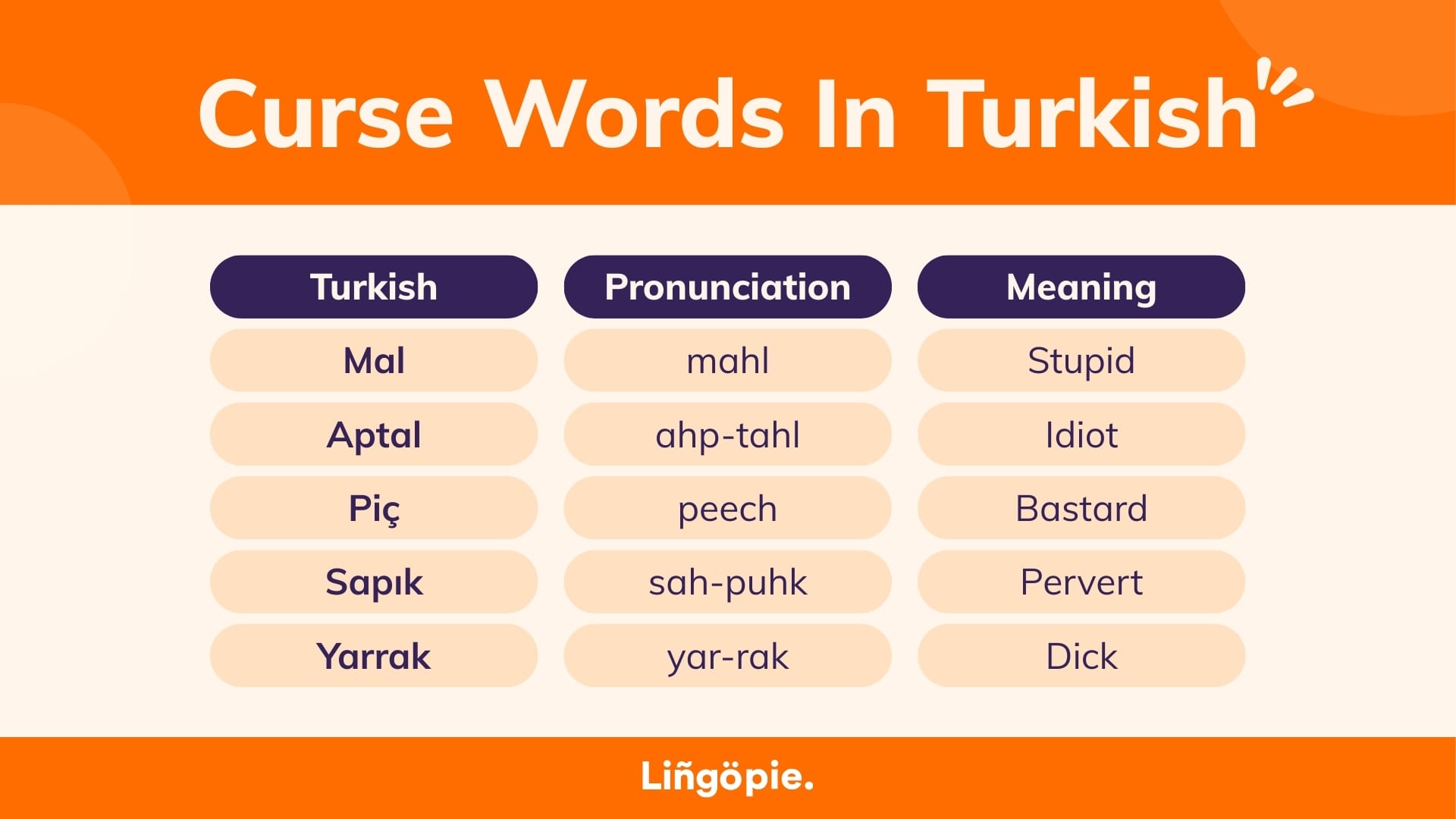You know how linguists get excited about the longest word in the world? Well, I got way more excited when my Turkish friends taught me their favorite curse words. Turns out, the most useful vocabulary comes in short, explosive packages that actually help you understand what people are really saying.
In this post, we're here to help you understand the world of Turkish curses, with all the flair and sensitivity it deserves. As always, please note that we're teaching you these swear words not so you can sound rude. Instead, this guide is here to help you finally getting the subtext when your Turkish friend is teasing you versus when they're genuinely annoyed.
Let's start learning Turkish, shall we?
- 20+ Colors In Turkish: Names And Cultural Significance
- Hello In Turkish: 10+ Greetings Native Speakers Use
- 18 Sweet Turkish Terms Of Endearment You Should Use

What is Offensive in Turkish Culture?
The biggest offense in Turkish culture is insulting someone's mother. Turkish culture places huge emphasis on respect and honor, especially around family and personal dignity, making family-related insults far more serious than casual swearing.
Here's what will get you in real trouble:
- Never mention someone's mother - This is the ultimate red line that can lead to actual violence
- Don't disrespect family hierarchy - Parents and elderly relatives are sacred territory
- Know your audience - Swearing with close friends? Usually fine. With strangers or in formal settings? Big mistake
- Watch the double standards - Some Turkish men think women shouldn't swear, though attitudes are changing
You'll hear more cursing at UEFA matches, during heated arguments, or when people are genuinely frustrated. The key is reading the room. Turkish culture runs deep on respect and family honor, so understanding these boundaries matters more than memorizing the actual curse words.
Common Turkish Curse Words And Phrases
Common Turkish curse words and phrases offer a colorful glimpse into the expressive nature of the language. But be cautious when using these curse words as they are highly offensive! Here's a rundown of some frequently used ones, along with their meanings, contextual usage, and pronunciation guides:

Amına koyayım
This phrase, quite literally meaning "I'll put it in your mother," is one of the most versatile and commonly used Turkish curses. It's typically employed to express frustration, anger, or disbelief. (Pronunciation: ah-muh-nuh koy-eye-um)
Example: "Amına koyayım, neden bu kadar geç geldin?" ("Damn it, why are you so late?")
Orospu çocuğu
Translating to "son of a bitch," this curse is often hurled as an insult or expression of contempt towards someone. (Pronunciation: oh-roh-spuh choh-joo)
Example: "Orospu çocuğu, beni kandırdın!" ("Son of a bitch, you tricked me!")
Ananı avradını sikeyim
A highly offensive phrase meaning "I'll fuck your mother and wife," commonly used in moments of extreme anger or outrage. (Pronunciation: ah-nuh-nuh ahv-rah-duh-nuh sih-key-um)
Example: "Ananı avradını sikeyim, bu ne biçim davranış?" ("Fuck your mother and wife, what kind of behavior is this?")
Siktir git
This curse, roughly translating to "fuck off," is straightforward and direct, often used to dismiss or rebuke someone. (Pronunciation: sihk-teer geet)
Example: "Siktir git buradan, sana ihtiyacım yok!" ("Fuck off from here, I don't need you!")
Allah belanı versin
Literally meaning "may Allah give you trouble," this phrase is used to curse someone, wishing misfortune upon them. (Pronunciation: ah-lah be-lah-nuh ver-sin)
Example: "Allah belanı versin, bana yardım etmedin!" ("May Allah give you trouble, you didn't help me!")

Mal
While not explicitly a curse word, "mal" is commonly used as an insult to denote someone as stupid or foolish. (Pronunciation: mahl)
Example: "Bu adam gerçekten mal, hiçbir şey anlamıyor." ("This guy is really stupid, he understands nothing.")
Aptal
While not as strong as some other curses, "aptal" means "stupid" or "idiot" and is often used to insult someone's intelligence. (Pronunciation: ahp-tahl)
Example: "Sen ne kadar aptalsın!" ("You are so stupid!")
Piç
This word translates to "bastard" and is used as an insult to describe someone whose parents are not married or as an expression of contempt. (Pronunciation: peech)
Example: "O piç beni dolandırdı!" ("That bastard cheated me!")
Sapık
This word translates to "pervert" and is used to insult someone's behavior or character. (Pronunciation: sah-puhk)
Example: "Bu adam gerçekten sapık, ona güvenme!" ("This guy is really a pervert, don't trust him!")
Yarrak
A highly offensive term meaning "penis," often used as an insult or expletive. (Pronunciation: yar-rak)
Example: "Yarrak gibi davranıyorsun, utan!" ("You're behaving like a dick, shame on you!")
Do Turkish People Swear as Much as Americans?
Swearing and cursing are part of daily life in Turkey and it's a fundamental part of how the locals interact. However, Turkish swearing works differently than American casual cursing. Americans from Gen Z swear about 24 times a day, while Baby Boomers use profanity 10 times daily, often just as casual speech fillers.
Turkish curse words carry more weight. In Turkish society, curse words are used to express strong emotions, establish camaraderie, or assert dominance, rather than as throwaway expressions.
Key differences in how they're used:
- Emotional release - Turkish curse words serve as "emotional punctuation marks, adding emphasis and intensity to everyday interactions"
- Social bonding - Among close friends, swearing shows familiarity and breaks down formality barriers
- Situational - More commonly used during sports events, heated debates, or moments of intense frustration
- Gender expectations - Turkish men think "only they are allowed to be rude and disgusting," while women face different social standards
- Context-heavy - What sounds playful between friends could be deeply offensive with strangers or elders
So to answer your question, Turkish people definitely swear, but it's more strategic and emotionally charged than the casual American habit of peppering conversations with "damn" or "shit."
- Spanish Curse Words: 20+ Bad Words & Insults Explained
- 12+ Japanese Curse Words With Context [Guide]
- 8+ Chinese Curse Words And Meanings Explained
When Turkish Curse Words Can Be Used Appropriately?
The appropriateness of Turkish curse words depends largely on the context and relationship between speakers. Situations such as sports events, heated debates, or moments of intense frustration are where curse words might be more commonly and acceptably used.
However, even in these contexts, it's essential to gauge the atmosphere and the sensitivities of those around you. Remember, the Turkish society runs deep on respect, especially around family and elders, so reading the room becomes crucial.
Safer options that work as exclamations or mild expressions:
- "Mal!" - Like saying "dummy!" when someone does something silly (safe with friends)
- "Aptal!" - Calling out foolish behavior, similar to "stupid!" in English (mild, generally acceptable)
- "Allah belanı versin!" - Wishing karma on someone rather than direct confrontation (cultural but not explosive)
- "Bok!" - Turkish equivalent of "shit!" when something goes wrong (frustration, not attacking people)
- "Çüş!" - An exclamation meaning "stop it!" or showing surprise (relatively mild)
- "Lan!" - Used among friends to get attention, like "dude!" (context-dependent but common)
Lastly, always remember that tone is everything. Many Turkish swear words can sound playful or cutting depending on how they're delivered. What makes friends laugh during a football match could seriously offend the same people in a different setting.
Caution and Cultural Sensitivity
Caution and cultural sensitivity are paramount when it comes to using curse words in Turkish or any language. Here's a closer look at why it's crucial to approach their usage with care:
Use Turkish Curse Words Responsibly
Curse words are not just strings of letters; they carry significant cultural and social weight. In Turkish society, certain words may be more taboo or offensive than others, and their usage can vary depending on factors such as age, gender, and social status.
It's essential for language learners and speakers alike to recognize the impact of their words and to use them responsibly, with sensitivity to the cultural norms and values of the Turkish community. Using curse words without awareness of their implications can lead to misunderstandings, hurt feelings, or even conflict, highlighting the importance of approaching language use with mindfulness and respect.
Risks of Using Curse Words
Using curse words inappropriately or in the wrong context can have negative consequences, ranging from causing offense to damaging relationships or reputations. What might be acceptable banter among friends could be perceived as disrespectful or confrontational in a different setting.
Moreover, misusing curse words may reflect poorly on the speaker's character or intelligence, reinforcing stereotypes or negative perceptions. Therefore, it's crucial to exercise caution and discernment when incorporating curse words into conversation, ensuring that their usage aligns with the dynamics and expectations of the situation.
Tips For Learning and Using Curse Words Respectfully
Learning and using curse words respectfully requires a combination of cultural awareness, linguistic competence, and social sensitivity.
One approach is to familiarize oneself with the cultural context and appropriate usage of curse words through immersion in the Turkish language and culture, whether through interactions with native speakers, exposure to media, or formal language study.
Additionally, seeking guidance from native speakers or language instructors can provide valuable insights into the nuances of curse word usage and help avoid missteps.
Finally, approaching curse words with humility and a willingness to learn fosters a respectful and responsible attitude toward language use, ensuring that communication remains effective, inclusive, and harmonious.
Final Words
As we wrap up our chat about Turkish curse words, let's remember the important stuff. We covered a lot, from where curse words come from to how to use them with care.
We learned that curse words aren't just words—they're loaded with history, culture, and emotions. Using the right means understanding when and where it's okay to let loose and when it's best to keep things clean. Learning a language isn't just about memorizing words; it's about diving into a whole new world. So, let's approach it with curiosity and respect.
Learn Languages by Watching TV Shows with Lingopie!
Lingopie is an excellent tool for fully immersing oneself in real TV series and films in your target language. You may watch a huge selection of foreign-language content with subtitles in both your native tongue and the target language with Lingopie. This helps you to take in engaging and culturally rich content while following along with the dialogue, learning new words, and honing your listening skills.
Try Lingopie to learn Turkish today!
Turkish Language & Swearing FAQ
What are the swear words in Turkish?
Some common Turkish swear words include “Amına koyayım” (an extremely vulgar insult) and “Orospu çocuğu” (meaning “son of a bitch”). These are highly offensive and should be used with caution, if at all. Turkish profanity often targets honor, family, or personal character.
How do you express anger in Turkish?
To say “angry” in Turkish, use “kızgın” or “öfkeli.” To express frustration, common phrases include “sinirliyim” (I'm annoyed) or “deliriyorum” (I'm going crazy). Tone and delivery matter just as much as vocabulary.
What is the weird ‘G’ in Turkish?
The letter “ğ” in Turkish is called “yumuşak ge” (soft g). It lengthens the vowel before it and has no direct English equivalent. It’s silent in most modern Turkish words but affects pronunciation flow.
What does “Eyvallah” mean in Turkish?
“Eyvallah” is an Arabic loanword that loosely means “alright,” “respect,” or “it’s all good.” It combines “yes” and “by Allah,” often used to express agreement, gratitude, or respect. Its tone is casual but carries weight in cultural interactions.
What is the Turkish swear gesture?
The fig sign (thumb placed between index and middle finger) is used in Turkey as a mild insult or to ward off bad luck. While offensive in some cultures, it's also believed to protect against the evil eye. Its meaning depends heavily on the situation and intent.
What is considered offensive in Turkey?
Public displays of affection, walking shirtless in public areas (outside beaches), or overly revealing clothing can be seen as disrespectful. Turkey is generally conservative in non-tourist regions. It’s always best to observe local norms and dress modestly when in doubt.









